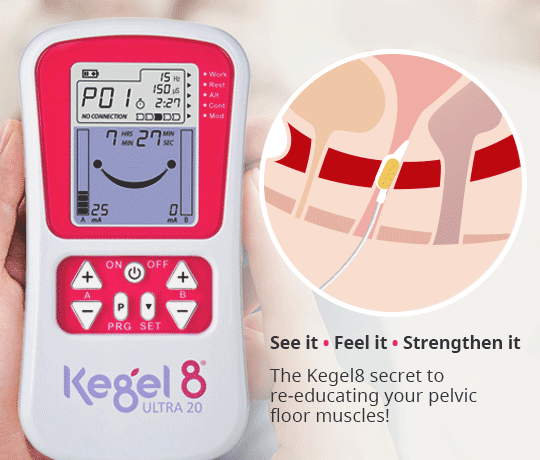
Incontinence during sex, also known as coital incontinence or sexual incontinence, refers to the involuntary leakage of urine during sexual activity. This condition can be distressing and embarrassing for those who experience it, and it may have various underlying causes. It's essential to note that incontinence during sex is not uncommon, and it can affect both men and women.
There are different types of incontinence that can occur during sexual activity:
Stress Incontinence: This is the most common type of incontinence during sex. Stress incontinence occurs when there is pressure on the bladder due to activities like laughing, sneezing, coughing, or sexual intercourse. During sex, movements and positions that put pressure on the pelvic floor can lead to the involuntary leakage of urine.
Urge Incontinence: Urge incontinence involves a sudden, strong urge to urinate, often accompanied by leakage. Sexual arousal and activity might trigger this urge, leading to incontinence during or after sex.
Overflow Incontinence: This occurs when the bladder doesn't empty properly, causing it to become overly full. During sexual activity, the pressure on the bladder can cause small amounts of urine to leak out.
Functional Incontinence: This type of incontinence is usually related to physical or cognitive limitations that make it difficult for a person to reach the bathroom in time. It might not be directly caused by sexual activity but can still impact it.
What causes incontinence during sex?
Pelvic Floor Weakness: Weakness in the muscles that support the bladder and control urinary function can lead to stress incontinence.
Childbirth: For those who have given birth vaginally, the pelvic floor muscles can become weakened or damaged, contributing to incontinence during sex.
Prostate Issues: prostate problems like an enlarged prostate or prostate surgery can lead to issues with urinary control during sexual activity.
Neurological Conditions: Conditions that affect the nervous system, such as multiple sclerosis or nerve damage, can disrupt the signals between the bladder and brain, leading to incontinence. Sometimes a sensitive bladder can trigger leaking with sex.
Hormonal Changes: Hormonal fluctuations, such as those occurring during menopause, can affect bladder and urinary function.
Medications: Some medications can influence bladder control and increase the risk of incontinence.
Obesity: Excess weight can put pressure on the bladder and contribute to incontinence.
Can Kegel Exercises stop me peeing during sex?
Kegel exercises, which involve contracting and relaxing the pelvic floor muscles, can help strengthen these muscles and improve urinary control. Strengthening the pelvic floor muscles can potentially have a positive impact on urinary incontinence, including situations like peeing during sex. However, the effectiveness of Kegel exercises in addressing this specific issue can vary depending on the underlying causes of the incontinence and individual factors.
If incontinence during sex is primarily caused by weak pelvic floor muscles, practicing Kegel exercises could potentially help by improving the muscle tone and control in the pelvic area. Stronger pelvic floor muscles can better support the bladder and help prevent involuntary urine leakage during activities that put pressure on the bladder, such as sexual intercourse. The additional benefit of using a device such as the Kegel8 Ultra 20 v2 or the Kegel8 V For Men is that it not only strengthens weak pelvic floor muscles, it also calms 'jangly' nerves that cause a sensitive bladder.
Clinical Evidence
Coital incontinence: Relation to detrusor overactivity and stress incontinence Coital Incontinence seems to be in the spectrum of SUI (stress urinary incontinence) and POP (Pelvic organ prolpase). Coital Incontinence is almost invariably a symptom of SUI with urethral sphincter incompetence, even when it occurs during orgasm. Many women with DOA leak during sex; however, the potential role of associated urethral incompetence should be considered.https://onlinelibrary.wiley.com/doi/10.1002/nau.21041
National Library of Medicine - Urinary leakage during sexual intercourse among women with incontinence: Incidence and risk factors https://www.ncbi.nlm.nih.gov/pmc/articles/PMC5443475/
Serati M, Salvatore S, Uccella S, Nappi RE, Bolis P. Female urinary incontinence during intercourse: a review on an understudied problem for women's sexuality. J Sex Med. 2009;6:40–48. doi: 10.1111/j.1743-6109.2008.01055.x [PubMed] [Google Scholar]
Jha S, Strelley K, Radley S. Incontinence during intercourse: myths unravelled. Int Urogynecol J. 2012;23:633–637. doi: 10.1007/s00192-011-1583-0 [PubMed] [Google Scholar]
4. El-Azab AS, Yousef HA, Seifeldein GS. Coital incontinence: relation to detrusor over-activity and stress incontinence. Neurourol Urodyn. 2011;30:520–524. doi: 10.1002/nau.21041 [PubMed] [Google Scholar]







